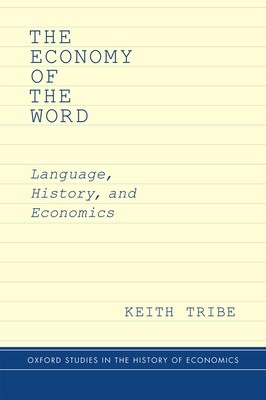
- We will send in 10–14 business days.
- Author: Keith Tribe
- Publisher: Oxford University Press, USA
- ISBN-10: 019021161X
- ISBN-13: 9780190211615
- Format: 16.3 x 23.9 x 2.8 cm, kieti viršeliai
- Language: English
- SAVE -10% with code: EXTRA
Reviews
Description
It was only in the sixteenth century that texts began to refer to the significance of "economic activity" -- of sustaining life. This was not because the ordinary business of life was thought unimportant, but because the principles governing economic conduct were thought to be obvious or uncontroversial. The subsequent development of economic writing thus parallels the development of capitalism in Western Europe. From the seventeenth to the twenty-first century there has been a constant shift in content, audience, and form of argument as the literature of economic argument developed. The Economy of the Word proposes that to understand the various forms that economic literature has taken, we need to adopt a more literary approach in economics specifically, to adopt the instruments and techniques of philology. This way we can conceive the history of economic thought to be an on-going work in progress, rather than the story of the emergence of modern economic thinking. This approach
demands that we pay attention to the construction of particular texts, showing the work of economic argument in different contexts. In sum, we need to pay attention to the "economy of the word".
EXTRA 10 % discount with code: EXTRA
The promotion ends in 23d.11:21:27
The discount code is valid when purchasing from 10 €. Discounts do not stack.
- Author: Keith Tribe
- Publisher: Oxford University Press, USA
- ISBN-10: 019021161X
- ISBN-13: 9780190211615
- Format: 16.3 x 23.9 x 2.8 cm, kieti viršeliai
- Language: English English
It was only in the sixteenth century that texts began to refer to the significance of "economic activity" -- of sustaining life. This was not because the ordinary business of life was thought unimportant, but because the principles governing economic conduct were thought to be obvious or uncontroversial. The subsequent development of economic writing thus parallels the development of capitalism in Western Europe. From the seventeenth to the twenty-first century there has been a constant shift in content, audience, and form of argument as the literature of economic argument developed. The Economy of the Word proposes that to understand the various forms that economic literature has taken, we need to adopt a more literary approach in economics specifically, to adopt the instruments and techniques of philology. This way we can conceive the history of economic thought to be an on-going work in progress, rather than the story of the emergence of modern economic thinking. This approach
demands that we pay attention to the construction of particular texts, showing the work of economic argument in different contexts. In sum, we need to pay attention to the "economy of the word".


Reviews